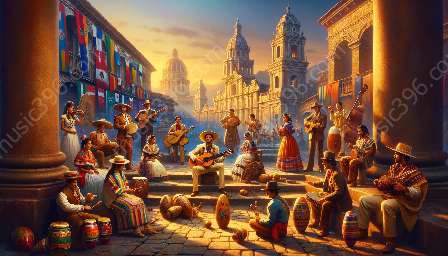Latino music has a rich and vibrant history that encapsulates a multitude of cultures, rhythms, and styles. It has evolved through a fascinating journey, influenced by the diverse experiences and traditions of Latin American and Caribbean communities. From the traditional beats of Afro-Cuban music to the contemporary sounds of reggaeton, Latino music has continually transformed, adapting to new contexts and embracing a wide array of influences. In this exploration of the evolution of Latino music, we will delve into the historical roots, cultural significance, and ethnomusicological implications of this captivating and diverse musical tradition.
The Origins and Influences of Latino Music
The roots of Latino music can be traced back to a complex interplay of Indigenous, African, and European musical traditions. The Indigenous peoples of Latin America had their own rich musical heritage, characterized by a diverse range of instruments and vocal styles. With the arrival of European colonizers, these traditions became intertwined with European musical elements, giving rise to new hybrid forms.
One of the most significant influences on Latino music came from the African diaspora. The transatlantic slave trade brought African rhythmic and melodic patterns to the Americas, where they merged with existing musical traditions, creating new and distinct musical styles. This fusion of African, Indigenous, and European musical elements laid the foundation for the diverse tapestry of Latino music that exists today.
The Cultural Significance of Latino Music
Latino music is deeply intertwined with the cultural identities and experiences of Latin American and Caribbean communities. It serves as a powerful means of expression, reflecting the struggles, triumphs, and celebrations of these diverse cultural groups. Traditional genres such as salsa, merengue, and cumbia are deeply embedded in the social fabric of Latino communities, providing a soundtrack for communal gatherings, dance, and religious ceremonies.
Furthermore, Latino music has played a crucial role in shaping and preserving cultural heritage. Through lyrics that convey stories of migration, social justice, and love, Latino music serves as a testament to the resilience and creativity of Latin American and Caribbean peoples. It has also served as a vehicle for cultural resistance, enabling marginalized communities to assert their identities and express solidarity with one another.
Ethnomusicological Perspectives
From an ethnomusicological standpoint, the study of Latino music provides valuable insights into the complexities of cultural exchange, identity formation, and musical hybridity. Ethnomusicologists analyze the dynamic processes through which musical traditions are created, maintained, and transformed within specific social and historical contexts. By examining the sociocultural meanings and functions of Latino music, ethnomusicologists contribute to a deeper understanding of the ways in which music shapes and reflects human experience.
Moreover, ethnomusicology offers a framework for exploring the interconnectedness of music and society, shedding light on the ways in which Latino music both mirrors and influences collective identities, power dynamics, and cross-cultural interactions. By examining the intricate threads that connect musical practices to broader social realities, ethnomusicologists illuminate the role of Latino music in shaping individual and communal experiences.
The Evolution Continues
As Latino music continues to evolve, it remains a dynamic and resilient force that reflects the ever-changing landscapes of Latin American and Caribbean cultures. From the rise of new genres like reggaeton and urbano to the ongoing reinterpretation of traditional folkloric music, Latino music continues to adapt and innovate, embracing influences from diverse global sources while maintaining its cultural roots.
The future of Latino music holds endless possibilities, as emerging artists and communities reinterpret and redefine the sounds of their heritage. As the evolution of Latino music continues to unfold, it will undoubtedly continue to be an integral part of the cultural tapestry, offering a platform for creative expression, cultural affirmation, and the celebration of diversity.



































